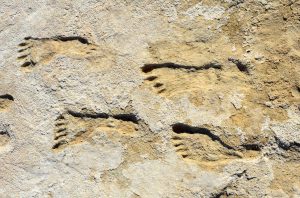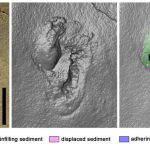How and when humans first colonised North America is a question that has long puzzled researchers. A groundbreaking new study by BU academics has shed new light on patterns of migration and reveals that humans may have reached the Americas 7,000 years earlier than previously thought.
The study, written by Professor Matthew Bennett and Dr Sally Reynolds and published in Science today, reveals that human footprints discovered in New Mexico date from 23,000 and 21,000 years old. The discovery has the potential to radically change our understanding of when the continent was settled and suggests that there is much still to be discovered about migrations and earlier populations in this part of the world.

The footprints were left in soft mud on the shores of what was once a shallow lake which now forms part of Alkali Flat – a large playa (a dried desert lake) at White Sands, New Mexico with the tracks seeming to be left mainly by teenagers and younger children. Seeds found in layers of sediment above and below the footprints were radiocarbon dated by the US Geological Survey, providing the research team with very precise dates for the footprints themselves.
Professor Bennett said: “The footprints left at White Sands give a picture of what was taking place, teenagers interacting with younger children and adults. We can think of our ancestors as quite functional, hunting and surviving, but what we see here is also activity of play, and of different ages coming together. A true insight into these early people.”
The pioneering research has been featured heavily in the media this morning with front page links on BBC News, The Times, The Guardian and many other media channels.
Science is viewed as one of the most prestigious academic journals with competition to be published so intense that less than 7% of submissions are accepted. Professor Bennett and Dr Reynold’s groundbreaking article highlights their decades of hard work and expertise in paleontology, human evolution and environmental & geographical sciences.
 Conversation article: A new species of early human? Why we should be cautious about new fossil footprint findings
Conversation article: A new species of early human? Why we should be cautious about new fossil footprint findings Our controversial footprint discovery suggests human-like creatures may have roamed Crete nearly 6m years ago
Our controversial footprint discovery suggests human-like creatures may have roamed Crete nearly 6m years ago How to hunt a giant sloth – according to ancient human footprints
How to hunt a giant sloth – according to ancient human footprints










 Dr. Ashraf cited on ‘Modest Fashion’ in The Guardian
Dr. Ashraf cited on ‘Modest Fashion’ in The Guardian NIHR-funded research launches website
NIHR-funded research launches website Academics write for newspaper in Nepal
Academics write for newspaper in Nepal New paper published on disability in women & girls
New paper published on disability in women & girls Global Consortium for Public Health Research 2025
Global Consortium for Public Health Research 2025 MSCA Postdoctoral Fellowships 2025 Call
MSCA Postdoctoral Fellowships 2025 Call ERC Advanced Grant 2025 Webinar
ERC Advanced Grant 2025 Webinar Horizon Europe Work Programme 2025 Published
Horizon Europe Work Programme 2025 Published Horizon Europe 2025 Work Programme pre-Published
Horizon Europe 2025 Work Programme pre-Published Update on UKRO services
Update on UKRO services European research project exploring use of ‘virtual twins’ to better manage metabolic associated fatty liver disease
European research project exploring use of ‘virtual twins’ to better manage metabolic associated fatty liver disease